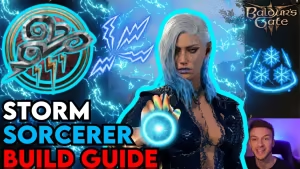Ware-B-Wise: Maximizing Your Coin in Baldur's Gate 3 with Smart Vendor Sales
Highlights
- To determine which items to sell to vendors in Baldur's Gate 3, players should prioritize selling items that are not useful for their character's class, level, and playstyle.
- Players can also check the value and rarity of each item to quickly identify those that are not worth keeping in their inventory and can be sold to vendors.
- The game's auto-sort feature can be used to quickly sort through inventory and identify items that can be sold, and players can also consult their D&D-playing son for advice.
Selling items to vendors in Baldur's Gate 3 can be a daunting task, especially when there are so many items available only a few hours into the game. However, by following a few simple guidelines, players can quickly and easily determine which items to sell to vendors.

The first step in determining which items to sell to vendors is to prioritize selling items that are not useful for your character's class, level, and playstyle. This will help you quickly identify items that you will not need in the near future and can therefore sell to vendors. For example, if you are playing a rogue, you may want to sell any weapons or armor that you find, as these items are unlikely to be useful to your character.
Another solution is to check the value of each item and sell those that have a low value compared to their weight. This will help you quickly identify items that are not worth keeping in your inventory and can therefore be sold to vendors. For example, if you find a potion that is only worth a few gold pieces and weighs a lot, it is probably not worth keeping in your inventory and can be sold to a vendor.
It's also important to consider the rarity of an item, as rare items may be more valuable to keep. Players should take the time to research the rarity of each item they find and consider whether it is worth keeping or selling. For example, if you find a rare magical weapon, it may be worth holding onto, even if it is not useful for your character's class, level, or playstyle.
Finally, players can use the game's auto-sort feature to quickly sort through their inventory and identify items that can be sold. This feature will automatically sort items by value, rarity, and other factors, making it easy to identify items that can be sold to vendors. Additionally, players can consult their D&D-playing son for advice, as everything in the game may have some use, and it's always good to have a second opinion.
In conclusion, determining which items to sell to vendors in Baldur's Gate 3 can be a simple process by following the above guidelines. Players should prioritize selling items that are not useful for their character's class, level, and playstyle, check the value and rarity of each item, use the game's auto-sort feature, and consult their D&D-playing son for advice. By following these steps, players can quickly and easily sell items to vendors and focus on the more important aspects of the game.
Related Articles
Forge Guardian: Tips and Tricks for Surviving the Honor Mode in Baldur's Gate 3
Baldur's Gate 3 Stats: Unleashing the Power of Character Customization, Combat, and Multiplayer
Whispering Mask in Baldur's Gate 3: How to Obtain Without Turning Against Your Party
Robes of the Wise: Uncovering More Monk Garb in Baldur's Gate 3
Arcane Tower Bernard's Missing Wyvern: A Hilarious Adventure in Baldur's Gate 3




